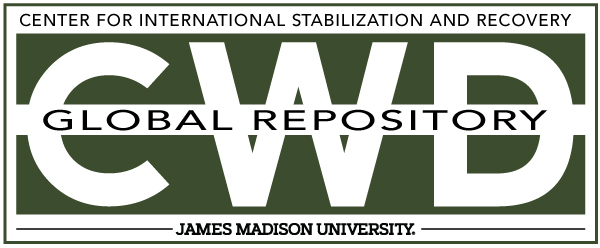Document Type
Other
Creative Commons License

This work is licensed under a Creative Commons Attribution-Noncommercial-No Derivative Works 4.0 License.
Publication Date
2009
Keywords
Advocacy and International Law, Colombia, 2009, Conference, Humanitarian Demining, CISR, JMU
Abstract
From 9 to 12 June 2009, representatives of the Colombian government’s humanitarian mine action office and the Humanitarian Demining Department of the Colombian military met to devise a way forward in planning for the expansion and enhancement of the country’s program to eradicate landmines from the national territory.
The Mine Action Information Center at James Madison University facilitated the Colombia Humanitarian Demining Planning Workshop (Taller de Planificación del Desminado Humanitario en Colombia) in Bogotá, Colombia. The workshop was sponsored by the U.S. Department of State’s Office of Weapons Removal and Abatement, and was attended by representatives from the U.S. and Colombian governments, international organizations, and key stakeholders in Colombia’s work against landmines.
More than 40 participants worked together to draft a Plan of Action for Colombian humanitarian demining activities. They will use the plan as a guiding document for developing future mine-action activities. The plan emphasized integration and cooperation among military forces, national authorities, and international partners. The workshop opened with speeches from Colombian Vice President Francisco Santos Calderón and Andrés Dávila, director of the Programa Presidencial de Acción Integral contra las Minas Antipersonal (PPAICMA, the Presidential Program for Comprehensive Action against Antipersonnel Landmines). Officials from PPAICMA and the Humanitarian Demining Department of the Armed Forces of Colombia then described for the group the current status of the country’s humanitarian mine clearance program and its planned expansion. Presentations by international counterparts from the Organization of American States, Jordan’s National Committee for Demining and Rehabilitation, Mines Advisory Group, the U.S. Department of State, and the U.S. Southern Command provided additional information and lessons learned from other mine-affected countries that were considered potentially useful in the Colombian context.
Included in
Defense and Security Studies Commons, Peace and Conflict Studies Commons, Public Policy Commons, Social Policy Commons



